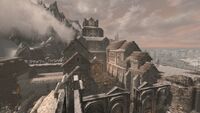The Ysgramor Dynasty (also called the Ysgramor Clan)[1] is the name given to the series of kings that ruled Skyrim after the time of Ysgramor in the Merethic and First Era. It pre-dates and overlaps with the First Empire of the Nords by centuries. Initially, Ysgramor established his kingdom after his victory against the Snow Elves. In the aftermath of The Return, Ysgramor laid the foundations of the first human Empire by building the city of Windhelm and the Palace of the Kings which dominated the center of the Old City. Winterhold, Eastmarch, the Rift, and the Pale, collectively known as the "Old Holds", were also established.[1][2]
After Ysgramor died, his descendants went on to rule his kingdom for centuries after. However, it should be noted that it was also around this time the authority of the Dragon Cult took hold and Dragon Priests ruled the land with an iron fist. The relationship between the cult and Ysgramor's Dynasty in respect to ruling is unknown, but some sources speculate that Ysgramor could have been a Dragon Priest himself (or at least associated with them) given his stature at the time.[UOL 1] Also, weaponry and heirlooms bearing dragon-headed mofits were known to be a mark of the royal line.[3]
The Dragon Cult was eventually overthrown after the Dragon War and the line of kings from Ysgramor's Dynasty continued in the following centuries. While many of the kings that came after Ysgramor remain unknown, one prominent ruler stands out. King Harald was the thirteenth in Ysgramor's line and is remembered for being the first king to relinquish all holdings in Atmora. Establishing the Nords as a separate people, he was responsible for the consolidation of Skyrim as a centralized kingdom.[4][5]
The Jagged Crown dates back to around Harald's reign and served as the symbol of office for the High King. The period of its usage is remembered as a time when the High King reigned by right of arms and collective adulation.[6] Around 1E 184, Harald established the first Moot - a gathering of representatives from each Hold to choose the next King from qualified members of the royal family. This continued as the system of succession for centuries.[7][2]
Ancient records indicate that Ysgramor's heirs battled a mysterious figure named Aumriel for decades until it was sealed away in Frostmere Crypt.[8] The Nordic goal of conquering the vast new land of Tamriel was fully realized under Harald's son, Vrage. King Vrage initiated multiple military expansions in 1E 240 that pushed past the borders of Ysgramor's kingdom and into High Rock and Morrowind, and heralded a greater empire known as the First Empire of the Nords. While it is unknown exactly how many rulers were part of the dynasty, the Ysgramor's lineage ended 1E 369 with the death of King Borgas.[2][1]
Known RulersEdit
| Name | Crowned | Died | Residence |
|---|---|---|---|
| Ysgramor | Late Merethic Era | Late Merethic Era | Windhelm[9] |
| Ylgar | Late Merethic Era | Late Merethic Era | Windhelm[2] |
| Harald | 1E 143[10] | 1E 221[10] | Windhelm[2] |
| Hjalmer | 1E 221[5][11] | 1E 222[11] | Windhelm[2] |
| Vrage the Gifted | 1E 222[11][12] | 1E ? | Windhelm[2] |
| Borgas | 1E ? | 1E 369[13] | Winterhold[13] |
ReferencesEdit
- ^ a b c Pocket Guide to the Empire, 3rd Edition: The Throat of the World: Skyrim — Imperial Geographical Society, 3E 432
- ^ a b c d e f g Pocket Guide to the Empire, 1st Edition: Skyrim — Imperial Geographical Society, 2E 864
- ^ Royal Ivory Hilt antiquity codex entry in ESO
- ^ Sacred Chalice of Ysgramor antiquity codex entry in ESO
- ^ a b Frontier, Conquest — University of Gwylim Press, 3E 344
- ^ Galmar Stone-Fist's dialogue in Skyrim
- ^ King's Belt Plate antiquity codex entry in ESO: Greymoor
- ^ Lost Legends — Talsgar the Elder, Archivist of Winterhold
- ^ Songs of the Return, Vol 19
- ^ a b Plaque in Windhelm
- ^ a b c The Daggerfall Chronicles — Ronald Wartow
- ^ King Edward, Part X — Anonymous
- ^ a b A History of Daggerfall — Odiva Gallwood
Note: The following references are considered to be unofficial sources. They are included to round off this article and may not be authoritative or conclusive.
